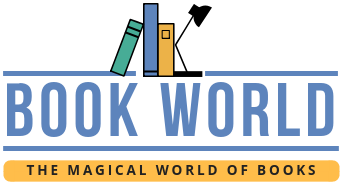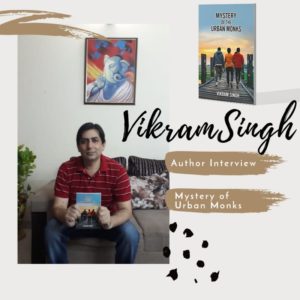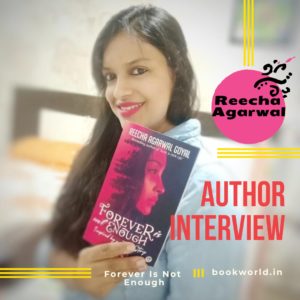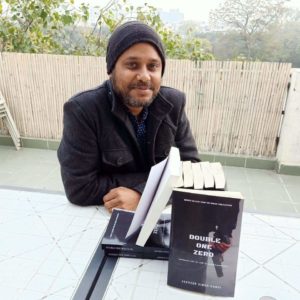
Author
About The Author Sujith Balakrishnan
Born and brought up in Palakad, a small district in the northern part of Kerela, Sujith Balakrishnan fondly remembers his childhood days spend amidst mountains, rivers, greeneries and paddy fields.
He left India in 1999 and from last 18 years, Dubai is his home. He has been passionate about literature and film ever since he remembers, but zeal to write came late in the twenties. Till date he has written 40 short stories and a recently released novel The Chronicles of Golgotha Days.
Male Authors Writing About Female Abuse
The movements like #MeToo encouraged women to bring forth their story of sexual harassment and assault. Just like all fingers are not same, the phrase all men are same is also not true. They are also stepping forward to support women.
Male authors are doing their bit by vehemently condemning such heinous acts of crime through their writings. Ravindra SIngh came up with the book Your Dreams Are Mine Now loosely based on the story of Nirbhaya. Amish Tripathi meted out barbaric punishment to the rapist gang in his book Ram The Scion of Ikshvaku. Kapil Raj told a heart rending story of Palak in his book Endurer A Rape Story.
And the latest The Chronicles of Golgotha Days by Sujith Balakrishnan, which received rave reviews from the readers, was also based on the real life spine chilling incident better known as The Suryanelli Case.
The author has penned the entire occurrence in such a plaintive manner that the story of the victim will break your heart and you will shudder thinking what the victim went through. You can actually feel the never ending suffering.
But the most horrifying part is that the justice is yet to prevail.
In a candid author interview, we asked the author how tough and stressful was it to write about this beastly inhuman act not just by a person but many, some being eminent and powerful people who were actually monsters in the garb of human skin. Here is the extract of the interview. Read on to know what the author has to share.

Q. The topic you have chosen to write is a sensitive one, what inspired you to pick up The Suryanelli Case?
A. The event that had been my inspiration for the novel occurred in 1996, when I was a second year engineering student. The incident gained media attention due to the nature of the assailants and the under age of the victim. More this was the first incident of this nature in Kerala.
Like anyone, the incident shocked me and haunted me reading the umpteen cosmetic stories being published in various yellow newspapers. The sad part in such incidents, when a high profile politician is involved is that it become a political crime and two groups takes the sides of the victim and the assailant. Ultimately the stronger candidate with the political clout wins influencing the Medias through debates and listing out all their fallacies and convincing it as the truth in front of the public by the justification army.
I never had a clue that I will publish a novel after 22 years past the event. What instigated me to initiate this novel 7 years back was when I accidentally saw the interview of the victim’s father stating “Our generation is going to end here”? The whole family was ostracized, alienated and mocked by the whole society depriving them of all the justice. After going through all these sufferings, a father who claims their family tree will end here is a shame to all of us, the so called civilized society.
I started writing the novel from 2011 and it took a long time to find a clear voice to present the voice of the protagonist. The point of view was changed so many times till it reached to the form which is published in the book.
Q. What is the ratio of fact and fiction in your story? How much research you have put into this book?
A. The novel is an independent inspiration of the event. I would like to stress again, my novel is inspired from the true events but not a clear cut reproduction of the occurred incidents. But one thing I can endorse that what the victim would have suffered would be much worse than what I have portrayed through the novel.
The research process took a long time which affected the flow and pace of writing. I have made several road trips for the novel and the one which I made during the rainy days of June last year on an Enfield with my friend that extended several days and nights played a key role.
Q. How draining was the whole process of penning the story?
A. Plotting the novel and finding a clear voice for the protagonist was the most draining process. In between, I have decided to keep it aside many a times like other unfinished works.
Spending seven years for a novel that too with such intense incidents was strenuous and excruciating discomfort. When I finished the manuscript of my Novel, it gave me a sense of depression and a weak mind. I extended the thought of going to a therapist to come out from the dilemma. I have dealt to answer the queries of the society, law, judiciary when all blame the culprit instead of supporting her. This is utter ruthlessness.
The novel ending is bit dark which is the reality as the true inspired characters are living in an anonymous location, waiting for justice.
Q. Do you think position of women has improved in India or it continue to be the same?
A. It has improved over a period of time but the real women empowerment is still miles away on the horizon, as the struggle and discrimination remains almost the same in every fragments. It’s very complex to achieve the real women empowerment as it is linked and intertwined with religion which is the prime basis of the gender stratification.
Q. Is it important to write an accessible book or to write keeping in mind keeping the literary beauty of the story?
A. I feel the current hectic world needs a more accessible book, ultimately it’s the writer’s sovereignty.
Q. Did you faced any writer's block while writing the book? How did you overcome it?
A. Yes, I felt in all stages and throughout the process of completing the novel. To achieve clarity of the protagonist’s voice was quite tedious and depressing to discover. It was initially written in a third person omniscient point of view, but when I returned back reading the novel it looked boring and fake. By that time I already reached half way through. The novel was then rewritten in the first point of view with a clear and simple tone.
The most depressing journey in writing the novel was the intermittent blocks I suffered in between writing process. Taking almost 7 years to complete a novel is a quiet long stint which could have done in a year if it was done without blocks.
Q. Tell us about your journey as a writer? When it all started and what hurdles you face to get your first book published?
A. I am a late starter in the arena of writing which started budding from the early twenties and became intense in my late twenties. For me, writing is a kind of compulsion which instigates me to do it for attaining some unexplainable pleasure and the void of not writing makes me feel as if I am loosing something treasured from my life.
The ardent aspiration for writing came inside me when I moved to Muscat in 1999. I know I cannot move freely as before and the only thing which could satisfy my artistic appetite was to read and write. These are the subliming and intense moments which makes me nudge and nudge in life to crawl forward.
Q. Are you a reader? Do you believe reading is necessary for writing?
A. I consider reading as vital as breathing in my day-to-day life. I had been away from writing for weeks and months and years, but I don’t remember being away from reading for not more than a week. It has before now been quoted by almost all writers that “without reading, you cannot excel in writing”. Reading is the only fuel that can drive your creativity to write.
Q. What are your future plans as a writer? Are you working on your next book?
A. I am currently working on my second novel, which had already passed half way through. It’s about the middle class crisis of a family man in his mid-thirties and an accidental event that changes their whole life.
Hopefully it should be released by the first quarter of 2020. In parallel, I am working on a black comedy screenplay about the life of a dejected, frustrated writer who still strongly believes he could build a life by writing.
I would like to convey gratitude to the author for finding time and agreeing to the interview. I wish him luck for his future projects and urge readers to read The Chronicles Of The Golgotha Days.
The real life Abhaya would always be in my prayer. Nobody has the power to revert the past, but I pray and wish that she finds joy and peace in her present and future.



